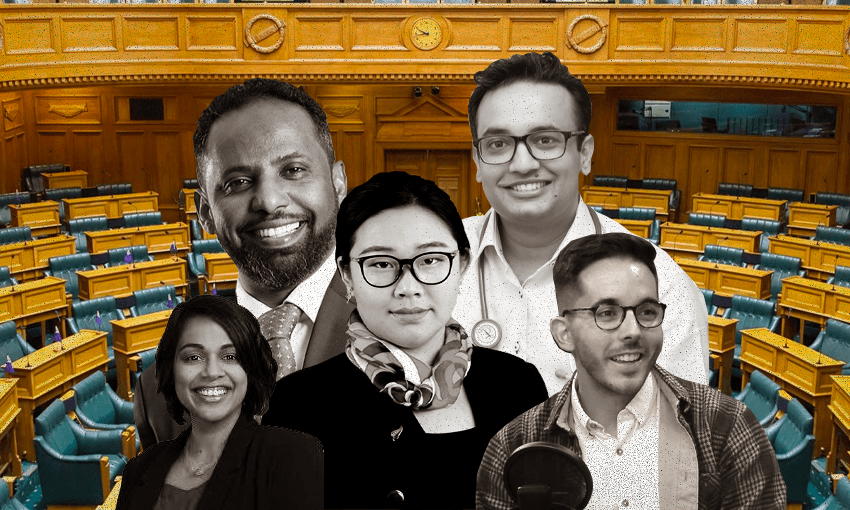While our newest migrant MPs are inspiring people across the world, their first week in parliament has not passed without controversy here in New Zealand.
Not since the early 1900s, when recent immigrants flooded the colonial parliament’s benches, has the Beehive seen such an influx of foreign-born MPs – albeit on a much smaller scale.
Along with five new New Zealand-born Pasifika MPs, the new parliament includes five new MPs who are migrants: the Green Party’s Ricardo Menendez-March, and Labour’s Gaurav Sharma, Naisi Chen, Ibrahim Omer and Vanushi Walters.
Of the five, Menendez-March has made the biggest splash so far, with a petition calling for him to be blocked from entering parliament after his tweet reflecting Green Party policy was misinterpreted as treasonous.
mfw they show me affirmation of allegiance to the queen pic.twitter.com/ufem9IPHwa
— Ricardo Menéndez (@RMarchNZ) October 22, 2020
“I guess it is a sign that we have systemic racism and systemic homophobia that when someone like myself, who’s a queer Latino, tries to have a nuanced conversation [about constitutional reform], people immediately to shut me down,” he told The Spinoff.
Referring to earlier comments by John Key and Jacinda Ardern, he continued: “But when a Pākehā prime minister tries to have a conversation about the make-up of our government, the level of backlash is quite different. I guess my concern is that it’s my friends and family at home who also see it.”
The Mexican-born list MP came to New Zealand for study in 2011, but in recent years he’s been working for Auckland Action Against Poverty.
“I’m here to speak up for people on the benefit and migrant workers,” the 32-year-old said. “Part of the xenophobia that occurs is that many migrant MPs will feel obliged to say they’re here for everyone, because they fear the backlash if they say otherwise.
“But I’ll be unapologetic in that I’ve come from these communities and parliament has neglected our communities for far too long. So I will speak unapologetically on their behalf.”
New Labour MP Gaurav Sharma’s first week in Wellington was not plain sailing either. The night after the election his phone charger caught fire, destroying his phone, forcing him to make a dash into parliament at 11pm to secure a replacement before his induction began the next morning. He says the halls of power aren’t totally unfamiliar having been given a special tour six years ago by Phil Goff, who at that time was a mentor of sorts to Sharma.
“He took me under his wing when he was the MP in Mt Roskill and he encouraged me to get involved,” he told The Spinoff.
But it wasn’t until he completed a Fulbright scholarship in Washington DC that the Indian-born doctor was finally convinced politics was for him.
“When I was in Washington I was five minutes away from the White House and watching the whole Donald Trump drama unfold cemented in my mind that you can make a huge difference in politics,” he said.
“I come from a very small village up in the mountains of India and I’ve been sent photos and videos of people celebrating in the streets. Every major TV station in India has run a story on me and somebody is even making a documentary about me.”
While Chlöe Swabrick holds the distinction of “baby of the house”, (yes that’s a real title given to a parliament’s youngest MP), Beijing-born Naisi Chen is only four months older. She says she sees herself not just as a voice for Asian communities, but also for third-culture kids and millennials.
“I’ve had lots and lots of congratulations, particularly from the Chinese community,” the 26-year-old said. “My WeChat has been inundated with lots of messages and obviously there’s all these people who I haven’t spoken to in five or six years who are suddenly coming up to me.
“But there’s also a tinge of sadness among Chinese people, as we account for around 5% of the population, but we now only have one person who speaks Chinese in the parliament.”
Another who already has some level of familiarity with the buildings around parliament is Ibrahim Omer. The Eritrean-born 42-year-old was the union rep for cleaners working at the Beehive and as the first African and only second refugee to enter government, he knows his rise is inspiring people across the world from similar backgrounds.
“Eritrea is one of the most oppressed countries in the world where thousands of young people leave the country every month, and we are dispersed all over the world. [Getting elected to parliament] gives young refugees hope that if we work hard we can do well and succeed in life.
“I’m getting calls and requests for interviews from people all over the world, and not just from Eritrea, but even international media like the BBC.”
Vanushi Walters moved to New Zealand as a five-year-old from Colombo, Sri Lanka, and this month replaced the retiring Paula Bennett as Upper Harbour’s electorate MP. Calling her first week “extraordinary”, the human rights lawyer says having a more diverse parliament is showing that New Zealand is becoming a more inclusive place.
“There’s a quote that goes, diversity is being asked to the party, inclusion is being asked to dance. To take that metaphor a little further, belonging and equity is having a seat at the table.
“I’ve always felt I belonged, having called New Zealand since 1987, but becoming a member of parliament will, I hope, help me ensure that others both from ethnic communities and from Upper Harbour feel their voices are heard.”





